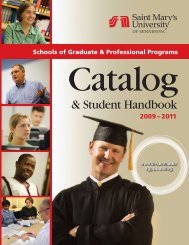PDF version - Saint Mary's University of Minnesota
PDF version - Saint Mary's University of Minnesota
PDF version - Saint Mary's University of Minnesota
Create successful ePaper yourself
Turn your PDF publications into a flip-book with our unique Google optimized e-Paper software.
Academic Policies and Procedures<br />
30<br />
Examples include: submission <strong>of</strong> a paper prepared by other persons or agencies, including commercial<br />
organizations; the combination <strong>of</strong> passages from various sources presented as one’s own<br />
thoughts or analysis.<br />
• Cheating is an act or attempted act <strong>of</strong> deception by which a student seeks to misrepresent that he/<br />
she has mastered information on an academic exercise that he/she has not mastered. Examples<br />
include: copying from another student’s test; allowing another student to copy from a test paper;<br />
taking a test for someone else; collaborating during a test or assignment with another student by<br />
giving or receiving information without the instructor’s permission; or using notes when disallowed.<br />
• Academic misconduct is the intentional violation <strong>of</strong> university policies by tampering with grades or<br />
taking part in obtaining or distributing any part <strong>of</strong> an administered test. Examples include: accessing<br />
academic files without appropriate permission, duplicating computer s<strong>of</strong>tware that has been<br />
copyrighted, and forging another person’s signature.<br />
Consequences <strong>of</strong> academic dishonesty: an instructor who has reason to believe a student has<br />
committed an act <strong>of</strong> academic dishonesty should investigate. As part <strong>of</strong> the investigation, the instructor<br />
should meet with the student to provide a fair opportunity for response to the allegation. If an instructor<br />
determines that there has been an instance <strong>of</strong> academic dishonesty, he/she must file an incident report<br />
with the <strong>of</strong>fice <strong>of</strong> the vice president for academic affairs who will keep a file <strong>of</strong> all confirmed accusations<br />
<strong>of</strong> academic dishonesty. The incident report may include a suggested sanction: a failing grade for the<br />
assignment or the course; in egregious circumstances, dismissal from the university.<br />
Upon referral, the <strong>of</strong>fice <strong>of</strong> the vice president for academic affairs will also investigate the charge <strong>of</strong><br />
academic dishonesty. The student will be provided the opportunity to respond to the allegation. The<br />
<strong>of</strong>fice <strong>of</strong> the vice president for academic affairs will then render judgment and impose sanctions. The<br />
student may appeal the judgment or sanction to the student judicial council. The basis for the appeal<br />
and the procedures that will be followed are as specified for disciplinary matters. No student accused<br />
or in violation <strong>of</strong> the university’s policy regarding academic dishonesty may withdraw from a course<br />
without the consent <strong>of</strong> the vice president for academic affairs until the allegation <strong>of</strong> dishonesty has<br />
been resolved. In cases where academic dishonesty has been established, the student may not<br />
withdraw from the course.<br />
Class Attendance<br />
Students are expected to attend all class meetings <strong>of</strong> courses for which they are registered. Absences<br />
from any class meeting weaken the learning experience. Instructors are encouraged to adhere to the<br />
following guidelines on student absences.<br />
• For any absence which is anticipated, the student is responsible for notifying the instructor by<br />
the class prior to the missed class. When athletic games are rescheduled due to weather, studentathletes<br />
must notify their instructors at least 18 hours prior to the missed class.<br />
• If any evaluative instrument is due on the day that the student will miss class, the student is responsible<br />
for submitting the work prior to the scheduled class meeting.<br />
• If a student fails to speak with the instructor prior to the absence and/or fails to complete the<br />
assignments, quizzes, or exams by the due date, the instructor is under no obligation to provide a<br />
make-up exam, quiz, or to accept late work, unless stated otherwise in the syllabus. A grade <strong>of</strong> “0<br />
points” on late work is appropriate.<br />
• In a class in which there are participation points given based solely on attendance, students will lose<br />
participation points even if they contact the instructor prior to missing class, except in the cases<br />
noted below:<br />
1. Student-athletes participating in one <strong>of</strong> the 21 NCAA sports.<br />
2. Students participating in music ensembles.<br />
3. Student senate <strong>of</strong>ficers representing the student body at pr<strong>of</strong>essional meetings.<br />
4. Students representing specific programs at events which promote the university<br />
5. IHM seminarians who are required to serve in liturgical events in their diocese (e.g., Holy<br />
Week services).
















